From the family that gives you experiences from their very own backyard in their homeland of Kerala, comes the extensive gift of experiences that float on the country’s longest lake – the Vembanad. The Spice Routes Luxury Cruises is the award winning company owned by Scaria Jose (who owns estates in the hills of Idukki district in Kerala that produce about 90 tonnes of cardamom a year) and his partners who have converted large boats (originally Kettuvallams) into luxury houseboats for holidaying on the backwaters.
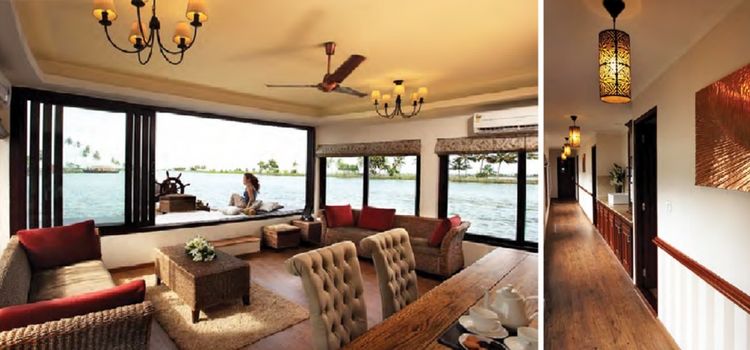
Escape the mainland
Located in Alleppey, the Venice of the East, the houseboats are lodged pretty strategically in Akkarakalam, which houses a traditional Syrian Christian homestead (a 10 acre farm). It offers a comfortable home stay for tourists, who want to experience the absolutely authentic rural way of life, before they start to explore the canals of Alleppey. The houseboats display close to a 5-star ambience, coming fully equipped with a sundeck, living rooms, dining rooms, bedrooms with attached toilets, fully fitted kitchenettes…you name it.
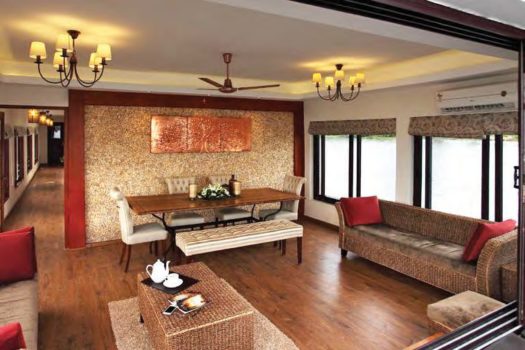
State of the art amenities, uninterrupted water supply, television (WiFi is your own, unfortunately), and a fully operational crew consisting of a driver, chef and assistants, make the holiday quite enjoyable. The houseboats are named after the spices that these large barges used to carry in the days of yore. Called Saffron, Clove, Cardamom, Cinnamon and Pepper, they all share spacious rooms that are fully air-conditioned.
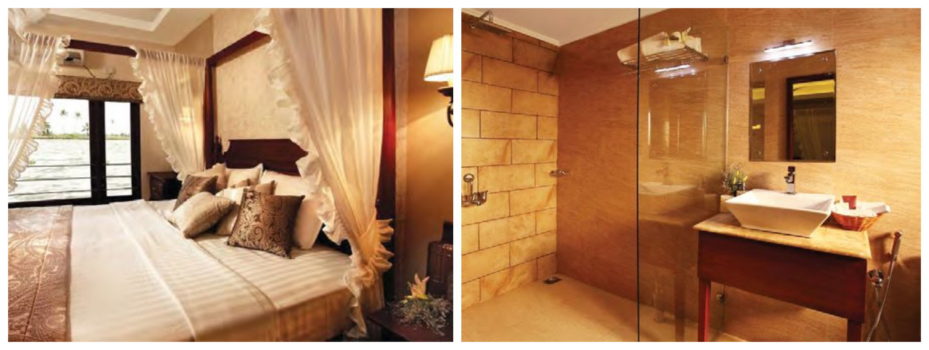
One can choose from a three-bedroom houseboat (Clove, and Cinnamon) or two (Pepper). The Presidential Suite in the Saffron is one that comes with a luxurious bedroom with a built in Jacuzzi, which overlooks the tantalizing lake, and the passing landscapes set aglow with the riveting sunrise and sunset. This one bedroom houseboat has a different layout, boasting of an upper deck and dining area.
All Aboard
My flight delivered me to Kochi in the early morning, and that is indeed the best time to start for Alleppey, since the cruise starts at 11am. We drove past the familiar streets of God’s Own Country and I was all excited and geared up for the famed backwaters cruise. The Akkarakalam Memoirs is the place where all the houseboats are cued and are ready to set sail. Settling in comfortably in the Cinnamon, I was ready to take on an overnighter. Equipped with my music, that comprised primarily flute and Jazz, I gazed into the vastness as life passed me by in slow motion.
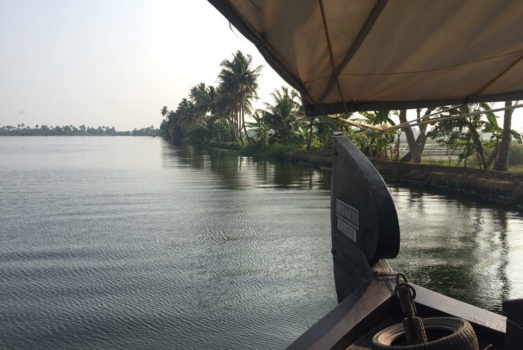
The landscape stretched through blue skies, subtle breezes, and the faint hum of the boat as it glided almost magically over the limpid waters. We aimlessly drifted past old churches, old temples, past people on shore washing their utensils, clothes and going about their chores like they could not see us. Life merely existed in the silence. The villages stumbled on, one after the other.
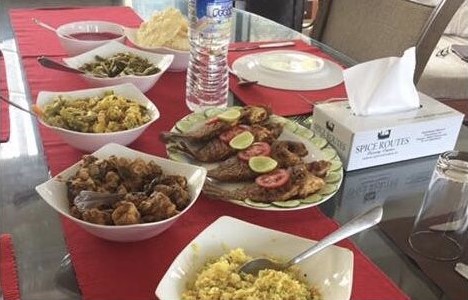
In the stillness of time, the sudden rumblings of our stomachs, more than gently reminded us that lunch was served as the noon sun shone through the air-conditioned windows. An amiable spread on the dining table prepared by our very own chef. He had cooked up a veritable feast, no doubt – the table was laden with chicken, fish, thoran, dal fry, mezhukkupyratty, sambar, plain rice, chappatis, Kerala appalams and condiments like pickle, curd and payasam as dessert. A befitting spread for guests that were treated with the utmost care.
Unique experiences
As we chatted post lunch, about the beautiful countryside, we found that available to us were the following (according to the routes we would have taken and the number of days that we could have chosen) – Champakulam, a 500 year oldSt Mary’s church, Patharimanal, a small island which was a favourite haunt of rare migratory birds, Ambalapuzha, Kerala’s most famous Sri Krishna temple, R Block – famous for farming done on reclaimed land, Karumadikuttan, a black granite Buddha from the 10th century, and the Krishnapuram Palace, built during the 18th century, to name a few. Not to be missed were the Kallu shops where the famous toddy (local alcoholic beverage) was sold.
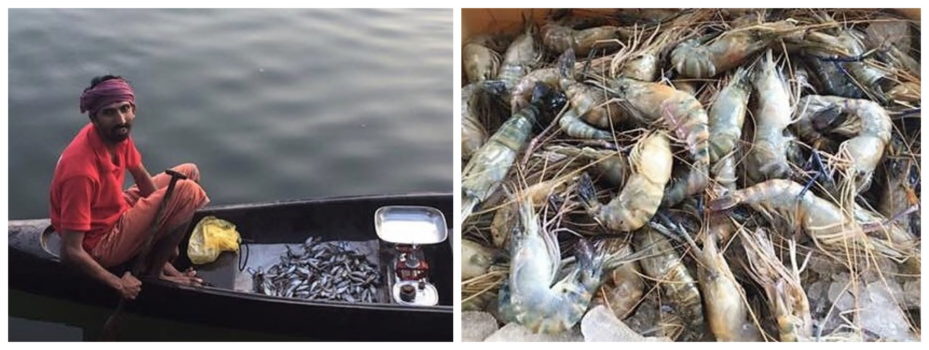
Late afternoon, as we dozed off letting the stillness and peace enter the boat, we were then asked to step off at a nearby village to experience the joy of picking out what we fancied for our dinner from a fresh batch of seafood – lobsters, different kinds of fish, tiger prawns and crab. Tea and banana fritters were served on our return. The boat then docked at a village where we got off to see the surroundings. The villagers were oblivious to our cameras and curiosity; they smiled, they understood and they were willing to share the beauty of their lovely land.
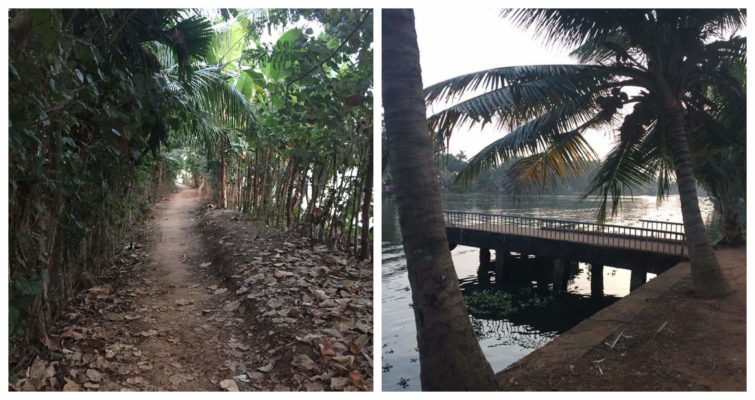
We walked, got our daily dose of exercise and took in the sights and sounds gleefully. Back at the boat, we watched the sunset in all its hues over glasses of wine, as the gold turned to orange and the day gave in to the dusk. The birds flew in patterns, being prompted by the day’s end. All seemed well in the world as the winds changed direction and night fell. Another menu, another serving and the chef was in action once again. His offerings this time – our choice of the catch of the day, mixed with a menu of soup, salad, gobi manchurian, palak paneer, veg kholapuri and many other tasty dishes.
A life on water
Post dinner we all sat in the living room, the boat now docked.( they do not sail post 6 pm). We sat around busy with our social media, some with books or kindles, the silence creating a sense of calm, separating us from the thoughts of our busy lives, work and plans for the morrow. Sufi music filled the air and we were ready to retire for the night, completely satiated and yet strangely fatigued from doing nothing. Our four postered beds beckoned, waiting to lull us into sleep. The next morning as we awoke, we realized that we were in motion again.
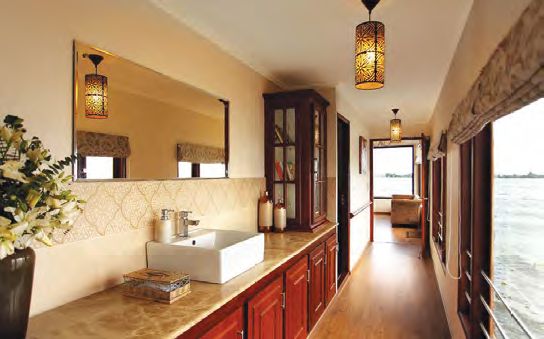
The journey was about to come to an end as we had our breakfast of fruit juice, cornflakes, eggs, appams with veg stew, toast and more. After breakfast we watched the early morning backwater life start, the school buses, postal services and vegetable sellers and shops literally floating. Everything takes on a water life of sorts, children learning to swim earlier than they can walk. Fishing becomes the mainstay of their livelihood. As the trip came to an end, so too did the dream. The peaceful overnighter gave us an experience that we would take back into our daily lives, longing and wanting to come back to the land of plenty, a land of peace and tranquility.
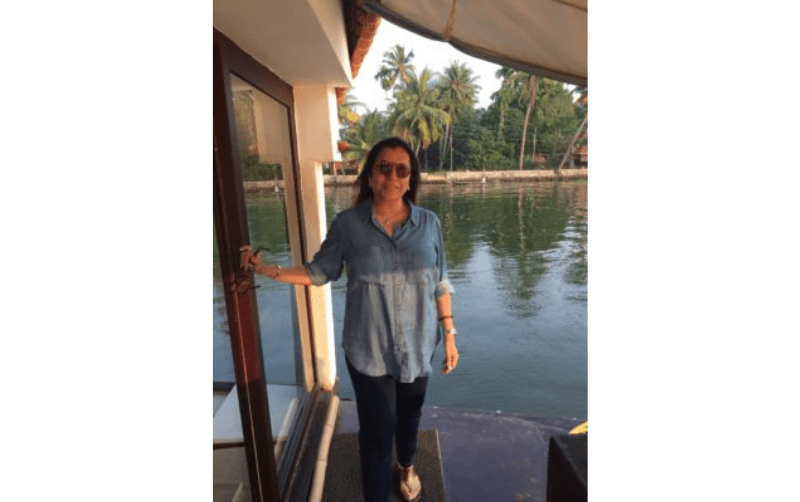
ACCESSIBILITY
By air
Trivandrum International Airport (151 Km by road)
Cochin International Airport (85 kms by road)
By road
Cars and Private Taxis since the highways are excellent. KSRTC buses and private transport
By rail
Alleppey is connected by rail to all the major cities in India.
By sea
Regular boat service and water taxis to places like Kottayam and Alleppey are available through the scenic backwaters.
Climate
Summer- (March- June)-Sun Block essential
Monsoon- (June-September)- People come from all over to experience the Kerala Monsoon.
Winter- (November to March)- Pleasant with sunshine and cool nights.
Pack
Modest/ Loose/ Cotton/ Comfortable clothes
Torch, Mosquito repellent, and sun tan lotion
Mobile chargers, sunglasses, hats and necessary medicines.
Previously published in FWD Life
Image Credits : Maya Lalchandani, FWD Life



